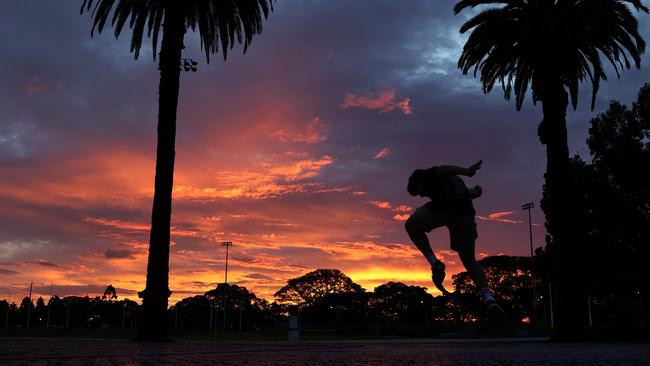
The night curtain is drawn along the length of the sky and sunset’s ephemerality blares the rule of nature: that nothing lasts forever. How I long for the last glow of the fiery embers to sustain themselves just a little longer, but the display is always gone, too quick, and my phone camera can never quite capture the intensity. In this between-time it feels as if the sky is in competition with the earth in a vast show-off moment in the battle of the realms, earthly versus heavenly; and like the boy soprano whose voice is most beautiful just before it breaks, or the mythical swansong of that silent bird who sings so sweetly just before death, the sunset feels like the moment of greatest glory in our Earth’s daily cycle of light.
We have Tonga to acknowledge for the intensity of the Australian sunsets we’re witnessing at the moment; that tragedy from last January when the devastating Hunga Tonga-Hunga Ha’apai undersea volcano erupted. It killed at least six people and caused an estimated $130 million damage, but it also threw up vast quantities of ash, sulphates and water vapour into the stratosphere. Atmospheric chemist Robyn Schofield, from Melbourne University, told the ABC the eruption sent up about three times more aerosols than usual, which is contributing to what we’re seeing right now in our early evening skies. “Particles in the atmosphere, on the whole, provide a surface to scatter,” she explained, “and it’s the scattering of light that causes our beautiful sunsets and sunrises.”
I am trying to teach my kids to open their eyes to the wondrous blaze of these skies; pausing the car at sundown, getting them to glance up, away from their phones. In silence we gaze for a moment at the sky as I think about loved ones lost, and where they are, if they are; and hope that if they are then this is their moment, when the universe bursts into its fiery warmth. There is god in that sky if you believe in a god. Anyone up there? Who knows, but sometimes it sure does feel like it. As the dissident Russian poet Anna Akhmatova wrote, “And the sunset itself on such waves of ether/That I just can’t comprehend/Whether it is the end of the day, the end of the world,/Or the mystery of mysteries in me again…”
Instagram taunts us at this time of year with pictures of the lucky ones who’ve escaped the cold to summery climes in the northern hemisphere. But hang on; our sunsets, we’ve still got those. Surely they’re among the most spectacular on Earth, especially up Top End way, and there’s a gratitude for that every dusk. As the Stoic philosopher Epictetus said, “He is a man of sense who does not grieve for what he has not, but rejoices in what he has.” So I choose to rejoice in our sunsets. And at this seasonal time especially, when so much of our weather is clenched with bitter cold, I look up to our skies in wonder. The air will lighten again soon, summer is just around the corner, and the intense sunsets from that Tongan eruption will last, it’s believed, for another year. Joy.




To the spectacle currently in our winter skies that is ending each day on a grace note for so many of us. I never noticed the sunsets in all my years in London – that sky felt too low, too cloudy and too diffuse in the liminal time between the light and the dark, as if seen through a gauze of pollution. But every evening in Australia, particularly in winter, there’s this gift in our skies; a moment of pause when the soul quietens if we let it. It’s the wondrous fulcrum between our busy days and our drawn-in wintry nights when the world seemingly holds its breath; a calming moment of astonishing beauty as the heft of the day turns once again to the dark.